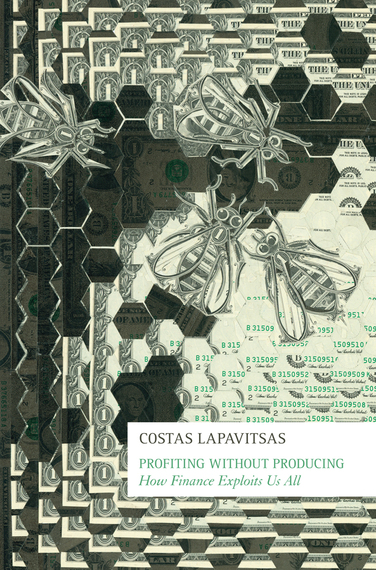There is a feeling among the public that something is wrong, out of balance in the American economy, even though pundits assure us everything is looking good. The U.S. financial sector has recovered from the crash, but the "real" economy hasn't. Outside of a few affluent areas, the economy is still a basket case -- a smaller percentage of Americans are working than any time since the stagflation era of the 1970s.
It is easy to blame the actions of individual bankers for the problem. For instance, the success of the movie The Wolf of Wall Street rests in part on Scorsese's ability to implicitly condemn while also indulge in one broker's excesses. However as a work of financial criticism, the film doesn't nail it: The real character the film is based on didn't work on Wall Street. The crisis was the not the product of an out-of-control individual. It was systematic.
Economist Costas Lapavitsas's latest work, Profiting Without Producing: How Finance Exploits Us All (Verso) offers an analysis of the crisis that is more profound -- and unsettling -- than other contemporary efforts, either popular or academic. For Lapavitsas, today's financial instability is not just an isolated episode that came out of nowhere. Moreover, he is careful not to blame individual lone wolves, or even bankers overall. Instead, in a historically informed analysis, Lapavitsas shows the crisis is characteristic of and the culmination of an entirely new epoch in capitalism which he terms "financialization."
Financialized capitalism dates since roughly the 1970s according to Lapavitsas. As opposed to earlier laissez faire or monopolist eras of capital accumulation, this new era can be easily identified by the asymmetric growth in finance compared to the real economy. It is characterized by a change in conduct by companies and even ourselves, with finance now penetrating everyday life. For instance, corporations focus on financial engineering, rather than on engineering or traditional production. Our housing and educational decisions are dominated by and interwoven with the financial system. Financialization is highly present in Anglo Saxon economies, but as Lapavitsas shows, in other leading economies too such as Japan and Germany.
Profiting Without Producing: How Finance Exploits Us All is therefore a sweeping
empirical and theoretical analysis of the capitalism's ongoing structural transformation. It draws heavily on classical Marxism as well as more contemporary strands such as Japanese Unoist Marxism (which I was previously unfamiliar with). Lapavitsas, a Professor of Economics at SOAS at the University of London, is highly knowledgeable of recent developments in mainstream contemporary theory, and these are presented in the book as well.
These very different strands of thought are interwoven throughout the text with footnotes adding additional commentary. (In fact, the footnotes can be read on their own for a lively, critical, literature review of mainstream economists' take on the crisis. Macroeconomists were largely caught flat-footed since there is no financial sector in traditional macro models. In fact the real challenge posed by economics, is why do banks exist at all? ) Lapavitsas' synthesis moves us beyond the mainstream's empty technical exercises but does not leave us in a historical abyss without contemporary detail. Overall, it leads us to a new understanding of how capitalism functions today.
Such new approaches are desperately needed. Consider recent policy initiatives such as big businesses agreeing not to discriminate against the long-term unemployed. Nice. But is this really going to restore equality, or Asian levels of growth? Something more radical is called for. With progressives searching for answers, Lapavitsas provides a framework for explaining the way we live now. And though financialization is unquestionable our present, as Lapavitsas book shows, it doesn't have to be our future.

